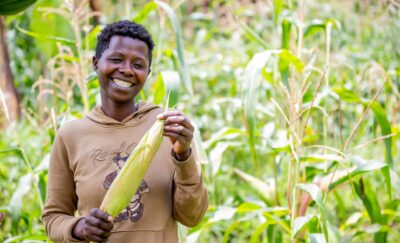Expert view
10 December 2012
Postcard from Kitui: "When you have food you can do things"

Photo: Mutamo with her family in front of the house she has been able to build thanks to Farm Africa’s climate-resilient farming project.
By Jonathan Finighan
We sit down in the shade of an unfinished brick house. It’s only 8am, but the sun is already scorching hot – the rains in Kitui, eastern Kenya, are late. Mutamo Malimu explains what a lot of farmers in the area are going through, while she tries to control a couple of children who are very excited by their unexpected visitors.
“When you have food you can do things, you can think about other things. When you have food you can make your life better.”
We’ve been in Kitui County for two weeks, interviewing farmers involved in Farm Africa’s climate- resilient farming project, to find out how the project had affected peoples’ lives. But when Mutamo talks I feel like I understand the project’s impact for the first time.
Mutamo made several changes on her farm after getting training with Farm Africa. She started growing sorghum and millet – crops that were grown by her grandparents and are well suited to the dry conditions and erratic rainfall of Kitui, but have been replaced by maize over the last few decades.
And with the help of other farmers in the Farm Africa project, she dug terraces and water-capturing zai pits on her farm to stop the topsoil being washed away and improve soil fertility.
Mutamo says this project has made a big change to their lives. Her food stores lasted for seven months this year, instead of five. This meant another two months when Mutamo and her husband could invest their money, time and energy on making their lives better.
So, for those seven months they’ve been building this new house. And Mutamo even re-enrolled in secondary school with her son. I was amazed she found the time to study and work on her farm every day!
But, despite all the positive changes brought about by the Farm Africa project, years of poor rainfall mean that many farmers are still struggling in Kitui.
As Mutamo explained, she and her son were sent home on the day before we arrived because they can no longer afford the fees: their food stores have run out, so what money they have must once again go to food.
And as infrequent and erratic rainfall becomes ever more a fact of life in Kitui and beyond, Farm Africa’s work to support farmers in finding innovative new ways of conserving what little water they have is becoming more important by the day.
– Jonathan Finighan is an Evaluation Researcher at Farm Africa. He recently spent three months in Kitui assessing the impact of Farm Africa’s climate-resilient farming project.
Read about the impact that our climate-resilient farming project is having on Nguuzi, another Kitui farmer.




